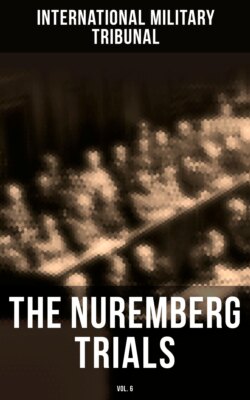Читать книгу The Nuremberg Trials (Vol.6) - International Military Tribunal - Страница 17
На сайте Литреса книга снята с продажи.
[The Tribunal recessed until 1400 hours.] Afternoon Session
ОглавлениеTable of Contents
DR. MARTIN HORN (Counsel for Defendant Von Ribbentrop): In the place of Dr. Von Rohrscheidt, counsel for Defendant Hess, I would like to make the following declaration.
Dr. Von Rohrscheidt has been the victim of an accident. He has broken his ankle. The Defendant Hess has asked me to notify the Tribunal that from now on until the end of the Trial, he desires to make use of his right under the Charter to defend himself. The reason that he wants to do that for the whole length of the Trial is to be found in the fact that due to his absence his counsel will not be informed of the proceedings of the Court.
THE PRESIDENT: The Tribunal will consider the oral application which has just been made to it on behalf of the Defendant Hess.
As to the objection to the affidavit of Von Schröder which was made this morning by counsel for the Defendant Von Papen, the Tribunal does not propose to lay down any general rule about the admission of affidavit evidence. But in the particular circumstances of this case, the Tribunal will admit the affidavit in question but will direct that if the affidavit is put in evidence, the man who made the affidavit, Von Schröder, must be presented, brought here immediately for cross-examination by the defendant’s counsel. When I say immediately I mean as soon as possible.
MAJOR BARRINGTON: My Lord, I will not introduce this affidavit.
THE PRESIDENT: Yes, Major Barrington.
MAJOR BARRINGTON: My Lord, before coming on to that affidavit, I last read a passage from the biography about the meeting at Von Schröder’s house, and I ask the Tribunal to deduce from that extract from the biography that it was at that meeting that a discussion took place between Von Papen and Hitler, which led up to the government of Hitler in which Von Papen served as Vice Chancellor. So that now at the point the Defendant Von Papen was completely committed to going along with the Nazi Party, and with his eyes open and on his own initiative he had helped materially to bring them into power.
The second allegation against the Defendant Von Papen is that he participated in the consolidation of Nazi control over Germany.
In the first critical year and a half of the Nazi consolidation Von Papen, as Vice Chancellor, was second only to Hitler in the Cabinet which carried out the Nazi program.
The process of consolidating the Nazi control of Germany by legislation has been fully dealt with earlier in this Trial. The high position of Von Papen must have associated him closely with such legislation. In July 1934 Hitler expressly thanked him for all that he had done for the co-ordination of the government of the National Revolution. That will appear in Document 2799-PS. In fact, although I shall read from that document in a minute, the document has been introduced to the Court by Mr. Alderman.
Two important decrees may be mentioned specially, as actually bearing the signature of Von Papen. First, the decree relating to the formation of special courts, dated the 21st of March 1933, for the trial of all cases involving political matters. The Tribunal has already taken judicial notice of this decree. The reference to the transcript is Page 30 (Volume II, Page 197) of the 22d of November, afternoon session.
This decree was the first step in the Nazification of the German judiciary. In all political cases it abolished fundamental rights, including the right of appeal, which had previously characterized the administration of German criminal justice.
On the same date, the 21st of March 1933, Von Papen personally signed the amnesty decree liberating all persons who had committed murder or any other crime between the 30th of January and the 21st of March 1933 in the National Revolution of the German people. That document is 2059-PS, and is on Page 30 of the English document book. I read Section 1.
THE PRESIDENT: I don’t think you need read the decrees if you will summarize them.
MAJOR BARRINGTON: If Your Lordship pleases, I will ask you to take judicial notice of that decree.
THE PRESIDENT: Yes.
MAJOR BARRINGTON: As a member of the Reich Cabinet, Von Papen was, in my submission, responsible for the legislation carried through even when the decrees did not actually bear his signature. But I shall mention as examples two categories of legislation in particular in order to show by reference to his own previous and contemporaneous statements that they were not matters of which he could say that as a respectable politician he took no interest in them.
First, the civil service. As a public servant himself, Von Papen must have had a hard but apparently successful struggle with his conscience when associating himself with the sweeping series of decrees for attaining Nazi control of the civil service. This has been dealt with on Page 30 (Volume II, Page 197) of the transcript of the 22d of November in the afternoon session, and Page 257 (Volume II, Page 207). In this connection I refer the Tribunal to Document 351-PS, which is on Page 1 of the document book. It is Exhibit USA-389, and it is the minutes of Hitler’s first Cabinet meeting on the 30th of January 1933. I read from the last paragraph of the minutes, on Page 5 of the document book in the middle of the paragraph:
